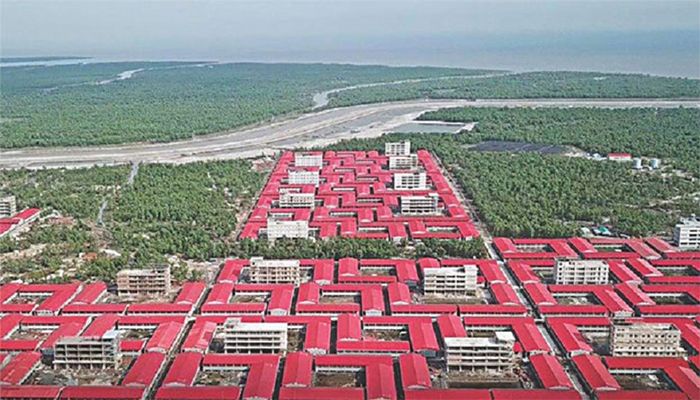
Desk Report
Publish: 25 Aug 2020, 10:06 am

The government has planned to begin the relocation of the Rohingya community currently residing in uncomfortably crowded camps in Cox's Bazaar to Bhashan Char after the monsoon.
"First, we will undertake a visit plan. We expect the begin transfer of Rohingyas after the monsoon to start," said Foreign Secretary Masud Bin Momen.
He said some 306 Rohingyas rescued in the Bay of Bengal and housed in the Island are doing fine, and the government will soon be meeting families of the housed Rohingyas and other members.
If they consider a better location than the collapsing camps in Cox's Bazar, the Foreign Secretary said they intend to begin the initial movement of Rohingyas there after the monsoon.
He said the UN teams are expected to visit Bhashan Char and prepare UN System’s assistance response. “We may also arrange a visit of human rights groups and select media to appreciate the facilities created,” Masud said.
The Foreign Secretary was speaking at a webinar on "The Rohingya Crisis: Western, Asian, and Bilateral Perspectives" organised by the Center for Peace Studies (CPS) of South Asian Institute of Policy and Governance (SIPG), North South University, Bangladesh in collaboration with the High Commission of Canada to Bangladesh.
In order to reduce all these risks, Masud Bin Momen said Bangladesh has invested hundreds of millions of US dollars on infrastructural development of the Bhashan Char Island to house a maximum of 100,000 people.
Masud said the island has provisions for 120 clusters. Each cluster can house 768 persons in 12 houses. A total of 1,440 houses and 120 shelter stations have been built. “We have undertaken efforts to make the island ready for habitation.”
Highlighting the arrangements, he said that the government has developed an adequate water , sanitation and vaccination program, with a referral mechanism for complicated health conditions. This also arranged for temporary jobs and livelihood opportunities (salt-tolerant paddy, horticulture, forestry, poultry and animal husbandry). It also arranged primary-non-formal and formal-education which can be extended to secondary education. Vocational education and skill development facility may be established in due course.
The Foreign Secretary said the mighty cyclone Amphan has attested to the durability of the island and quality of the structures built. “Detractors should now stop their propaganda on Bhashan Char and examine how to relieve pressure off from the highly congested Cox’s Bazar area where locals are outnumbered at a ratio of 2:1.” He said third country resettlement (TCR) as an alternative to Bhashan Char relocation is a welcome thought.
“Given the past experience of TCR globally in recent years, this cannot be a serious option, other than some countries getting the satisfaction of offering something new. If a group of countries can jointly offer to take over half a million Rohingyas in a time span of 1-2 years, we may consider examining it.” He urged countries to convince Myanmar to bring changes in Rakhine and implement the repatriation arrangements. On efforts to repatriation of Rohingyas, the Foreign Secretary said Bangladesh from the very beginning tried to find a peaceful solution to the Rohingya crisis through bilateral consultation. “We engaged Myanmar early for sustainable repatriation in an environment of safety, security and dignity.”
At the behest of Myanmar and the support of a few other nations, Bangladesh sought twice to repatriate. Failure to do so attests to the fact that the Rohingyas do not feel confident in the current situation, which does not render the returnees sure of the honesty of the Myanmar authorities and even of the majority community-the Buddhists of Rakhine, he said.
“Bangladesh expects friends of Myanmar and other countries in the region to convince Myanmar of the imperative to make material changes in Rakhine -- security-wise, economically and politically,” he said. The Foreign Secretary expects that the UN agencies would soon develop skill development programmes for the Rohingya youths and locals in consultation with Bangladesh authorities. There could be other kinds of improvement of short-term amenities and facilities if we have adequate support from the international partners.
However, he said, “I must clarify here that we would certainly not prefer investments which will directly or indirectly prolong the refugee situation and create greater and newer pull factors for remaining Rohingyas inside Rakhine.”
Bangladesh Government rejects any notion of local integration.
"We should expect committed stakeholders to speak to the Government of Myanmar and make these long-term investments in health , education, livelihoods and connectivity for Rohingyas in northern Rakhine. So far, we do not see any such attempts to hold Rohingyas inside Rakhine, "Masud said.
Former foreign affairs minister of Malaysia Syed Hamid Albar, US Ambassador to Dhaka Earl R. Miller, former Foreign Secretary and Senior Fellow of NSU Md Shahidul Haque, Canadian High Commissioner Benoit Préfontaine, Prof Atiqul Islam and Dr Ishrat Zakia Sultana of NSU also spoke at the webinar.
Subscribe Shampratik Deshkal Youtube Channel
© 2024 Shampratik Deshkal All Rights Reserved. Design & Developed By Root Soft Bangladesh